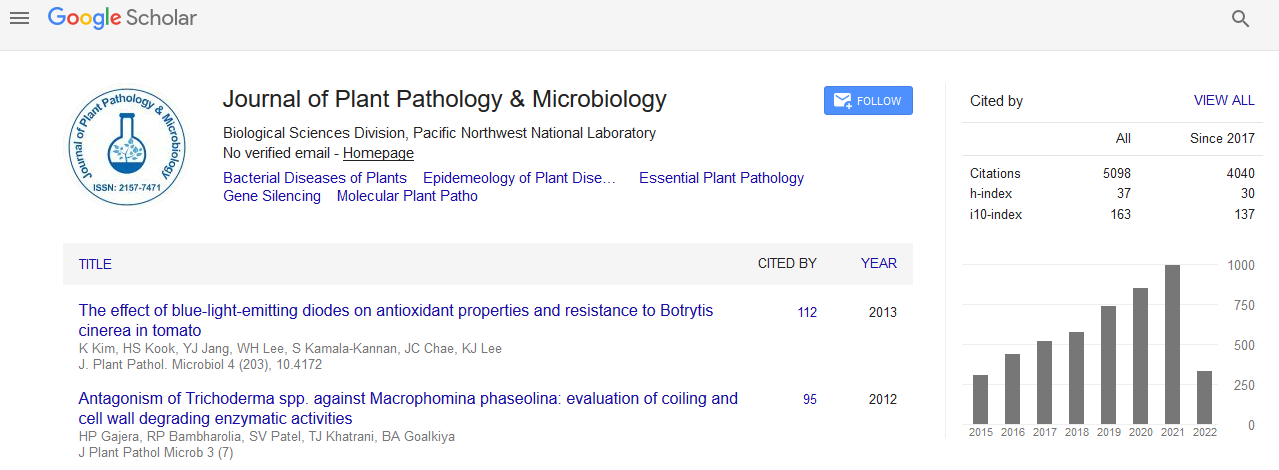PMC/PubMed Indexed Articles
Indexed In
- Open J Gate
- Genamics JournalSeek
- Academic Keys
- JournalTOCs
- CiteFactor
- Ulrich's Periodicals Directory
- Access to Global Online Research in Agriculture (AGORA)
- Electronic Journals Library
- Centre for Agriculture and Biosciences International (CABI)
- RefSeek
- Directory of Research Journal Indexing (DRJI)
- Hamdard University
- EBSCO A-Z
- OCLC- WorldCat
- Scholarsteer
- SWB online catalog
- Virtual Library of Biology (vifabio)
- Publons
- Geneva Foundation for Medical Education and Research
- Euro Pub
- Google Scholar
Useful Links
Share This Page
Journal Flyer

Open Access Journals
- Agri and Aquaculture
- Biochemistry
- Bioinformatics & Systems Biology
- Business & Management
- Chemistry
- Clinical Sciences
- Engineering
- Food & Nutrition
- General Science
- Genetics & Molecular Biology
- Immunology & Microbiology
- Medical Sciences
- Neuroscience & Psychology
- Nursing & Health Care
- Pharmaceutical Sciences
Abstract
Coniella granati (Saccardo) a New Potential Threat to Pomegranate (Punica granatum L.) in Tunisia Causing Twig Dieback and Fruit Rot
Hayfa Jabnoun- Khiareddine, Nesrine Ibrahim, Rania Aydi Ben Abdallah, Messaoud Mars, Zeinab Kthiri and Mejda Daami- Remadi
The disease caused by Coniella granati (Saccardo) (syn. Pilidiella granati, Saccardo) is an expanding threat to pomegranate (Punica granatum L.) cultivation and industry and is rapidly emerging in almost all pomegranateproducing regions of the world. The current study presents the first attempt to characterize C. granati associated with pomegranate dieback, shoot blight and fruit rot in Tunisia. Pathogenic isolates were identified based on their cultural and morphological characteristics and molecular data. Collected C. granati isolates were shown able to grow between 10°C and 30°C with an optimal mycelial growth at 20-25°C but they did not grow at 35°C. The fungus was able to grow 4-10 pH with an optimum growth at pH 4-5 for Cg1 and Cg2 isolates. Potato Dextrose Agar (PDA), Carrot Agar (CA) and Oatmeal Agar (OA) followed by pomegranate juice agar (PJA) and Malt Extract Agar (MEA) favored its mycelial growth. Pathogen growth was reduced under continuous light in comparison with the 12 h light/12 h dark regime and was significantly slowest under 24 h dark regime. Inoculated to pomegranate cv. Gabsi fruits, C. granati isolates induced soft rot within 9 days following incubation at 25°C and a complete fruit rot after 15 days. Leaves were highly susceptible to C. granati infection and completely degenerated 5 days post-inoculation. C. granati isolates were found to be pathogenic on pomegranate cv. Gabsi attached shoots and detached branches, giving rise to brown necrotic lesions. Keeping in view the importance of the pomegranate crop and the destructive nature of Coniella induced disease, further studies are needed to verify the pathogen host range, its aggressiveness towards the mostly grown Tunisian pomegranate varieties and to search for suitable control methods.


